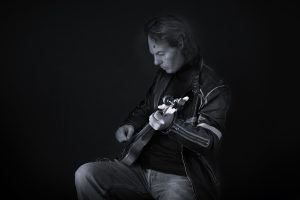Meet the Author: Michael Loyd Gray

Today we welcome author Michael Loyd Gray, whose novella will be published in early 2025. We’re excited for you to learn more about him and his writing!
Michael is an invited member of the Society of Midland Authors; he’s published six novels and more than forty short stories. He is the winner of the 2005 Alligator Juniper Fiction Prize, the 2005 The Writers Place Award for Fiction, and a support grant from the Elizabeth George Foundation. He earned a MFA from Western Michigan University, a bachelor’s from the University of Illinois, and has taught at universities and colleges. Gray lives in Kalamazoo, Michigan, where he collects electric guitars, roots for the Chicago Bears, and tries to keep up with two cats, Suzie Lucifer and Yoda Lucifer.

Five Quick Questions for the Author
Who are some of your favorite authors, and why?
In the seventh grade — Mr. Lincoln McGurk’s English class at Jefferson Junior High School — we read Hemingway’s The Old Man and the Sea and Dickens’ A Tale of Two Cities. Those were the first two serious books I read. That was when I learned there was something called literature and it was a lot different than reading The Hardy Boys, for example. Those books were an awakening of sorts for me.
So, Hemingway – more than Dickens, who I nonetheless enjoyed, too — was my first influence growing up in the sleepy college town of Champaign, Illinois. I learned a lot about writing from his stories and novels. I learned how you could tell complex stories with simple, direct language. Maybe that’s the best lesson. I even met Hemingway’ oldest son, Jack, during a visit to Sun Valley, Idaho.
But I kept reading other writers and learning. I read Bobbie Ann Mason, Ellen Gilchrist, Aritha Van Herk, Flannery O’Connor, Eudora Welty, Stuart Dybek, Charles Portis, Joseph Heller, Virginia Woolf, and Kurt Vonnegut. Stuart Dybek was my MFA mentor at Western Michigan University, and he knew Vonnegut at Iowa, giving me an indirect connection to Vonnegut.
When did you know you were a writer?
I could always write. Even in grade school, I wrote in complete sentences and could spell. Writing made sense to me the way math made sense to some of the other kids. Now, math made no sense to me whatsoever and so I knew way back then that maybe writing was going to be an option. But it wasn’t until I did ten years writing for newspapers in Illinois and Arizona, that I knew I could do more than formulaic news stories, that I could create fiction. When that sunk in, I quit my job, sold my house, and entered the MFA program at Western Michigan University.
Where were you born? Do you think the places of our lives inform our writing?
Jonesboro, Arkansas. Not far from Memphis and Graceland. We visited Graceland when I was a boy but didn’t see Elvis. My mother lived in a shotgun house with no indoor bathroom when I was born. Across the street were rickety shacks and one of them had been a house of prostitution when my mother was just a girl during World War II.
But by the time I was a year old or so, we moved to Chicago, and then a year after that downstate to Champaign, which was then a quiet college town surrounded by cornfields and mediocrity. But growing up there in the shadow of the University of Illinois, which I would go on to graduate from with a degree in Journalism, played a huge role in who I became. Growing up in a northern college town exposed me to a variety of cultures and ideas. It spared me a southern conservative upbringing of willful ignorance from people still fighting the Civil War with Confederate battle flags on their vehicles.
I do believe that where we live informs our writing. I’ve written several novels using a fictional Argus, Illinois, as a setting. It’s a made-up place, of course, but inspired by my experiences spending summers as a teenager on a lake near a small town called Neoga.
But writing is also informed by the places we visit, however briefly – or even in our imaginations. I recently finished writing a new novel, I Just Don’t Get Karaoke, that begins here in Kalamazoo, where I live, but then moves to Beaver Island, a small island in Lake Michigan I have visited only in my imagination. The novel ends in Manhattan, in Tribeca, a place I visited once for a few days. Everywhere we go, whether by plane or car or in a dream, is the landscape of our writing.
Where would you vacation—city, country, beach, or mountains?
Not a big city, even though I always found Chicago to be interesting. I’ve been to Paris. Honolulu was fun, exotic. And Los Angeles was intriguing for a few visits when I lived north of there in Ventura. The same for Manhattan – interesting, and I loved my visit to the Museum of Modern Art. It was a revelation.
But ultimately, all big cities are too hectic, too fast-paced – too much traffic. I prefer a clear horizon, the rising and setting sun. I sill say the best sunset over water I ever saw was not on Maui, which admittedly was pretty good, but in Petoskey, Michigan, which is of course, the heart of northern Michigan Hemingway country.
So, I just prefer good country. Trees and hills and lakes and rivers. We have a lot of that here in Michigan. I’ll admit to fantasizing about somehow living in England, somewhere out away from the large cities, in good English countryside, with a town nearby that’s not too big. I watch a lot of shows set in the United Kingdom just to see all the wonderful country. I watched eight seasons of “Shetland” as much for the setting as the story and characters.
What do you think is the most important part of storytelling?
After you make sure there’s actually a real story in your story, then I’d say voice is the most important part. How your story sounds. How the protagonist sounds. His or her voice is the magic elixir that flows from the page into the mind of a reader where it undergoes an alchemy that converts it into a movie the reader can see and hear – and step seamlessly into the story.
I don’t start writing a novel or story until I feel I have the voice. If I have a character and some sense of that character’s identity and conflict, then I figure out how it all sounds and once I find that groove, I can let my imagination take over and the story comes out and moves forward each day.
I don’t need to know a lot to start. I don’t do elaborate character arcs, for example. I prefer to learn where the story wants to go each day when I sit down and pick up the narrative thread again. It’s a process of discovery. Supposedly, Salvador Dali once said he was just the hand holding the brush. There’s a bit more to it than that, but I always felt I understood his meaning.
